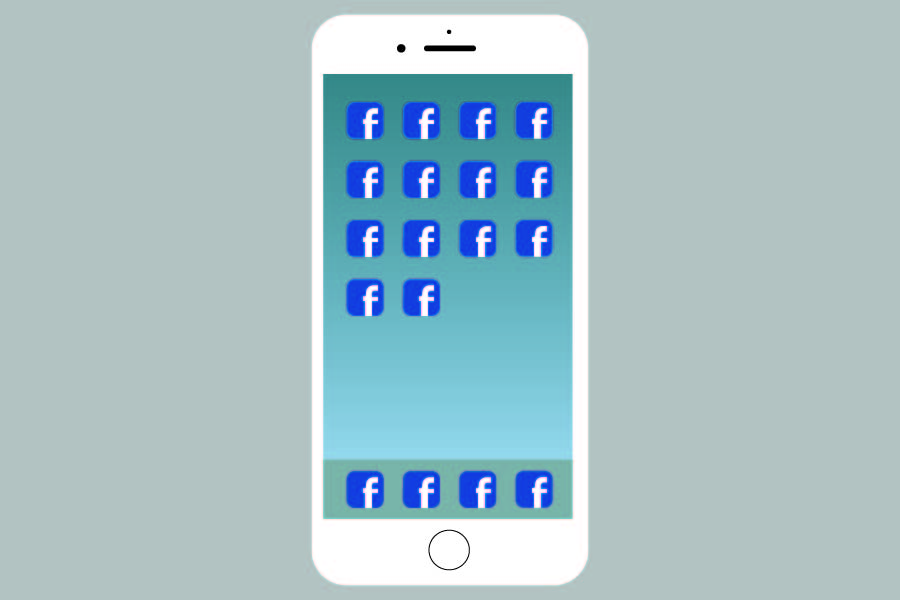
Help or hinderance?
Over the last 10 years, social media has transformed the way people interact and learn, for better and for worse, raising many questions about how it impacts education. In a recent interview with Axios, Facebook’s founding president Sean Parker made a few quite revealing remarks about the potential negative impacts of Facebook and other platforms like it.
“I don’t know if I really understood the consequences of what I was saying, because [of] the unintended consequences of a network when it grows to a billion or 2 billion people,” Parker said. “It literally changes your relationship with society, with each other […] It probably interferes with productivity in weird ways.”
With Facebook and other social media platforms exploding in popularity during the formative years of today’s college students, it’s worth considering whether UC Davis students generally view social media as a help or a hinderance in education.
On the positive side, social media, especially Facebook, is conducive to allowing students to coordinate more easily by creating pages and groups for specific class years, majors, clubs or courses.
“I’ve joined several groups for courses, like MCB 103, BIS 102, BIS 101, PHY 7C,” said Simranjeet Benipal, a fourth-year biochemistry major. “I usually don’t join them initially, but in the past friends have let me know that I should because they might have answers to questions I have.”
Benipal noted that having easy access to friends as resources through social media can make things more convenient by allowing students to move at their own pace and perhaps avoid interacting with professors. While this may be helpful if students have difficulty with those types of interactions, it may also prevent those skills from being built.
“It can be a pain to go to office hours because coming up with smart questions can be difficult,” Benipal said. “It’s my personal belief that you learn better if you find a solution yourself […] Talking to a professor in office hours or in lecture can be daunting. You don’t want to be the person who asks a stupid question.”
While many professors provide notes and study materials through their Canvas pages, student-run groups on Facebook can often be reliable sources for finding supplementary materials or for getting notes for classes when the professors don’t make notes readily available.
“Facebook pages for classes are helpful if someone needs help finding information for a class,” said Karen Zuniga, a fourth-year wildlife, fish and conservation biology major. “I’d say I join two groups on average each quarter.”
On the other hand, Zuniga also pointed out some of the negative impacts that social media has on study habits. She indicated that having class resources readily available on social media through their peers can create a type of dependency.
“Sometimes, I don’t go to class because I know someone will post the notes,” Zuniga said. “However, if you totally slack off, that’s your fault.”
In addition to perhaps fostering dependence or incentivizing laziness, social media can also distract students during or outside of class. Computer science graduate student Parsoa Khorsand explained that social media can have good impacts for education, but he also admitted that he has allowed it to have a fairly large presence in his routine.
“It’s generally a positive thing,” Khorsand said. “But with Twitter, I guess I’m kind of addicted to it. I have three desktop displays and Twitter is always open on one of them. I look at it every couple of minutes automatically. It probably has a negative effect.”
While the problem of checking phones in class is not always because of social media, social media certainly contributes to the problem. That said, students have varied opinions regarding whether this should be acceptable.
“Sometimes [a lecture] is a little boring so I take out to my phone,” Zuniga said. “I obviously get less out of it, but it can make it more bearable. I try not to judge others when I see them do it because I know that that’s me sometimes.”
On the other end of the spectrum, Benipal made it clear that he disagrees with the habit of checking phones during class and encourages students to listen to what the professor is saying.
While many people scroll through news feeds to briefly escape from a study session or a lecture, social media can also serve as a direct source of information that must be dealt with carefully. In an age with so much misinformation, it can often be difficult to separate fact from fiction, which makes social media sites potentially even more dangerous for influencing the way people think. Zuniga, Khorsand and Benipal all said that it’s important to try to remain objective and to let information discovered through social media simply stimulate curiosity about subjects rather than coax one’s own opinions too far in any direction.
“Sometimes [information I find on Facebook] makes me think about a topic more,” Zuniga said. “Some people only rely on what they see on Facebook, but I’m always trying to balance it out to understand problems fully.”
Khorsand emphasized that it is the responsibility of students to carefully evaluate the information they find on social media because if they do so, it can open up many doors for discovering new ways of thinking about topics.
“Exposing yourself to opinions that aren’t your own is healthy […] and can help you learn something new,” Khorsand said.
With such conflicting feelings regarding the ability to reconcile social media’s usefulness with its addictive power and potential to misinform, these three students effectively demonstrate the many challenges society faces in containing social media as a tool that can be utilized to learn rather than manipulate people. Parker’s statement captures the uncertainty over just how much society’s embrace of social media impacts students.
“God only knows what it’s doing to our children’s brains,” Parker said.
Written by: Benjamin Porter — features@theaggie.org



